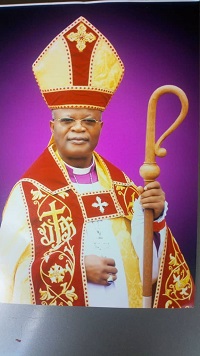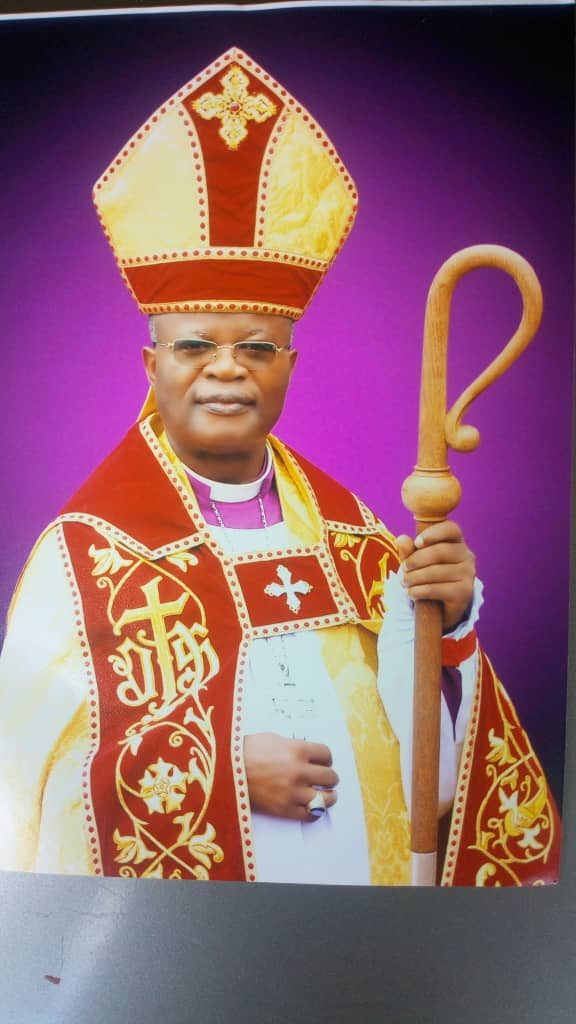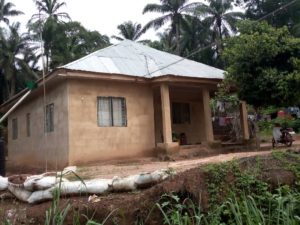Orphans and widows: Why we are passionate about them
The Rt. Revd David Onuoha is the Bishop of the Diocese of Okigwe South Anglican Communion which was inaugurated on January 8, 1994. It was carved out of the former Diocese of Okigwe -Orlu. The Diocese started with 10 Priests, 8 parishes, and 48 church stations, there were five archdeaconries Viz: Cathedral Area, Etiti, Obowo, Uboma, Ehime Archdeaconries. Presently the Diocese has about 31parishes, 82 churches, 60 Priest, 65 Church Teaches and Catechists. There are now 9 Archdeaconries and one Missionary Archdeaconry for evangelistic mission.
The Administrative office of the Diocese started at the former Etiti Archdeaconry office Isinweke and was later transferred to Ezeoke NSU when a building was erected for same. But today, a permanent and befitting designated Diocesan Office Complex has been erected courtesy of the Episcopacy of the Rt. Rev. D.O.C Onuoha who became bishop of the diocese in 2004.
The Diocese upon creation inherited one mission school- St Margaret’s Convent Umuariam Obowo now Sir Enoch Anyanwu memorial Convent Umuariam but today there are about 6 mission Schools as centres of learning, excellence and evangelism for youths. Today, the diocese has embarked on a lot of charity projects that have made it a diocese of pride for the Church of Nigeria. Bishop Onuoha shares the story of the diocese with Gbenga Osinaike who was recently in the diocese’s administrative office at Ezeoke Nsu in Imo State, Nigeria.
This diocese is 25 years this year. How has it been manning a diocese of this magnitude?
It has been great, encouraging and challenging. I am the third bishop of the diocese. I was elected and consecrated the third bishop and the first indigenous bishop.
We hear that you have been making a lot of impact since you came. Is it because you’re an indigene of this area?
If I were to be posted to another diocese I would have worked with similar passion. It is the work of God. I have no special bias for my hometown.
So how did you come about being a priest in the first?
My initial desire as a child growing up was to be a lawyer. I used to visit the courts to observe them in sessions in preparation for becoming a lawyer. But along the line I got inspired to go into priesthood. The calling to priesthood was actually inspired by a local catechist in the church. I was very active in church even as a child. At the age of 14 I was appointed to start helping in children Sunday school. I was in the choir, the youth fellowship, the brigade.
In 1982, this catechist came to our home very early in the morning and said God was going to use me in His vineyard. I later heard the church was going to recruit into its workforce. I applied. That was in 1982 after my school certificate. That was when I worked in the church environment. I was employed as a Church teacher. That was when I began to develop interest in working as a priest. By September of the succeeding year I applied and gained admission to Trinity College Owerri for a diploma in Theology. I made a distinction upon graduation. I was ordained by the then Bishop of Okigwe Orlu.
In 1987 I was made deacon and the next year I was priested. I began to serve henceforth. I once became the chairman of the diocesan youth board. I was given that appointment after a thorough search by a committee. That made me the youngest member of the board. I have been enjoying God’s favour in ministry despite the attendant challenges. I studied religion at the university and graduated in 1994 and also did a master’s degree in Religion and Society. After my first degree I was seconded to Trinity College Seminary to teach. I was a lecturer teaching Greek and the NT and Africa Traditional religion. I also served as chaplain of the school. I worked at the St. Paul’s University College. In addition to lecturing I was appointed the coordinator of the distant learning programme of the institution.
I was preferred a canon in Nov 1998 by the diocese of Okigwe south. I held the license of Bishop of Orlu. Immediately my installation, the Bishop of Orlu preferred me Archdeacon three weeks after. But I was not tied down to administrative duties. Mine was more in lecturing though I was archdeacon.
What was your own experience about being born again. We hear some Anglican Bishops are born again?
Experiences differ. There are people whose conversion are not dramatic while there are those who experienced dramatic conversion. Timothy and Paul readily come to mind. While Paul had a dramatic encounter with Jesus on the road to Damascus, Timothy had known the Lord from his childhood.
In my case as a boy listening to what was taught in the church especially the call for purity really had great impact in my life. That prayer created God consciousness in me. It meant God sees my heart and knows what I do. I was saved because the seed of God had been planted in me. So it got to a point that by the special grace of God I had this inner ministration of total surrender. It was not dramatic like some others. There are no stereotypes with God. What people are saying about an Anglican priest being born again is true when you make dramatic turn. There must be a point of turning. But if all your life is lived in the church, it may not be as dramatic like that of others.
What is your understanding about the present state of the church globally going by your experience in the Seminary?
Today, people are trying to accommodate the doctrine of post humanism. The main doctrine of post humanism is human right. They take positions like: I have the right to do what I want to do. I can do whatever I want to do with my body. The baby in my womb is my own and I can do away with it. We also have the doctrine of revisionism which is also gaining ground. People are consciously rewriting certain portions of the Bible and turning it in such a way that God could no longer be our father that he could be our mother. But true knowledge of the Bible will help to stabilize our understanding.
But then what do you think about these adjustments in the light of the many Bible translations we have?
The word of God is not subject to scientific proof. It is not subject to the changes of modernism. It is the word that shapes the world and not the other way round. A lot of wrong teachings are flying around. In the beginning God created them male and female. Today, they would want to change that to entrench man to man relationship. Those passages where this is expressly forbidden are being expunged.
You taught Greek in the seminary. That perhaps will make you have an edge. What do you make of Jesus’ statement that it will be easier for Carmel to pass through the eyes of a needle than for a rich man to enter heaven?
We taught and studied guided Greek. It gives you the key that makes you look to some other issues. We have not really explored it. There are issues that are universal and there are issues that are local. The camel passing through the eye of a needle is not the cloth needle. In those days there were opening through which a hen comes into the house. It will easier for a camel to pass through the eye of the needle which is a gate in Israel. There is a small one meant for sheep. That is the eye of the needle not the sewing needle.
As the third bishop in this diocese how has it been? I was told you have taken some giant steps since you became the bishop
I am not aware that I have done a lot. We are just doing the best given the circumstance we find ourselves. It is a diocese that covers three local government areas. By the time of my consecration there was no single bank in the area. My predecessor toiled and laboured but the reality is that there is nothing to attract people to this place. Upon my election I did not want to accept the appointment.
Why?
I had attended all the synods of my predecessors in this diocese. What I saw discouraged me. It’s not that my predecessor bishop was not working hard but the environment was too tough. The only bank came only two years ago and it’s a small outpost that can pass for a cash office. For our banking needs we must go to Owerri or Umuahia.
The church must have felt it was necessary to get an indigene so that he would not have any excuse. When I was asked to come here I went to wait on the Lord for the Lord to open my eyes. It was while travailing in prayers that God told me to hold stakeholders forum. So I met members of the dioceses in strategic places across the country. I sensitized them and came back home and encouraged every church to open an account and make the details known to their sons and daughters abroad. Now they pay money into their accounts. That has been helping us. That was how we started. We made the people realize that we have to build the diocese. I decided to challenge the challenges. As we were comparing notes in the last synod, the highest tither in this diocese does not worship more than two times here. His tithe is in millions. We decided to cut down on a few other things. We cut our cloth according to our cloth not our size. We maintained our old budget while using the excess we have to impact lives around us. The quota to parishes became smaller by the special grace of God who has made the indigenes to see the diocese as their own project
Orphans and widows project: What informed this?
As a bishop I see myself as being in the business of redistributing resources. The gifts people give us are not meant for us. We get from the rich and redistribute to the needy. We must define poverty in the contest of the vulnerable like the orphans, the widows, the aged. But then, I went to this particular couple living in a thatched house during one of our familiarization tours. The husband was sick. Right in the apartment was a mat where they sleep. Cooking items were in the same enclosure. I felt touched. That was where I began to think that the church should do something about the situation of the poor. I called one of my confidants in the diocese who God has been using to help my ministry and I told him what I wanted to do but can’t do because of paucity of funds.
In 2005, the former SSG of Imo State Prof. Enoch Anyanwu came to me and said that God gave him a mandate to help the poor. Our definition of the poor are the helpless. I believe the orphans and the widows are priority and then the old people and the physically challenged. He said he will be giving me N6million naira every year specially to help the poor by that he meant the orphans, the helpless, and the vulnerable in the diocese. He had worked several years in the World Bank. He was a professor of developmental economics. So we started the charity and we have refused to deploy the funds he gives every year to another thing apart from charity. Even after his death his children still continue sending the money. What we do cuts across denominations. Not only Anglicans.
We build houses for poor couples and widows. The house becomes their own. We do that every year since we began the project. We feel that it will be unjust to tell people about heaven and yet they don’t have a feel of that here on earth. We believe that it is not proper to watch people die of poverty. The intervention of Prof. Anyanwu has gone a long way to bail many out of poverty and to help the helpless especially the orphans and widows. We have done a lot of scholarships too for indigent students. There is this boy who was in his second year at the Madona University. His father died and the mother could not continue to sponsor him in school. We had to give him scholarship till he finished school. He is now working as a medical doctor.
But why don’t you invest the money so you then get more to help?
We have not thought of investing the money. But it’s something we should consider so as to be able to sustain it. But right now we deploy the money to help widows, orphans, indigent students and pursue other charitable courses. The orphans for instance are quite vulnerable. They need all the assistance so also the widows. I organize this Bible recitation programme every year called Logos Festival. For this particular year which was the starting point we asked the children to recite a book of the Bible. The Holy Spirit works on word. So we started the logos festival. That year I gave out the book of Ephesian. Anybody who could memorize the book is given automatic scholarship. To my surprise it was a blind boy who led the competition. He read the whole of the book of Ephesian from the first word to the last word with the commas and full stop. The boy was staying with the grandparents in the village. We decided to sponsor him from primary school to the university. Presently he is a fourth year student in law at the Nnamdi Azikwe University.
How did it happen? Who taught the blind boy?
I was taken aback myself by that feat. So I began to investigate who coached him. It was just last year during the retreat of those to be ordained, I discover that one of them was the priest that coached him.
But then how do you handle abuse of the scheme?
The local priest verifies the need and there is a committee that sees it through. Orphans, widows and helpless people are our priority. We have taken up legal cases. There was a case of a man that was asked to leave a community because the courts claimed that his father was not legally married to his mother. I had to get our lawyers to challenge the case. Thank God he won the case.
Have you been able to help in terms of curbing some traditional rites forced on widows in the diocese too?
Every member of the diocese has the consciousness that widowhood practices are not allowed especially those ones that are inimical to health and barbaric. It has not been easy.
So what has been your other projects since you came and what are your projections for the diocese?
By the special grace of God we were able to put up the Bishop’s palace. We have hospital with about 125 people earning a livelihood from it. My projections is in the nearest future people will be true disciples and Christ will be formed in them through the teaching and preaching of the undiluted word. I want to see a diocese where worshiping God will be a delight.




